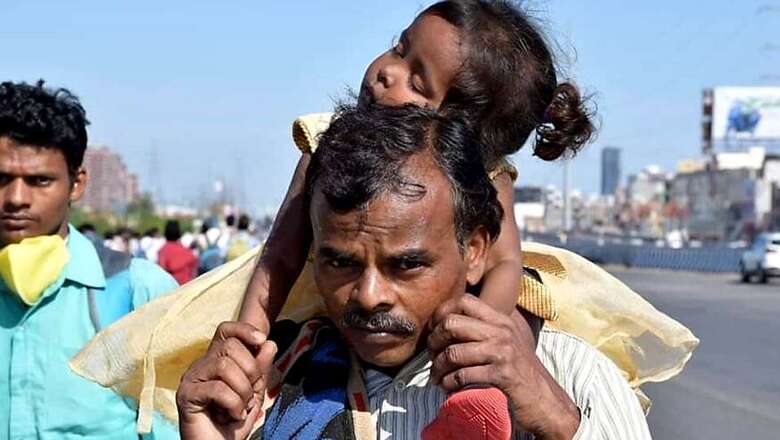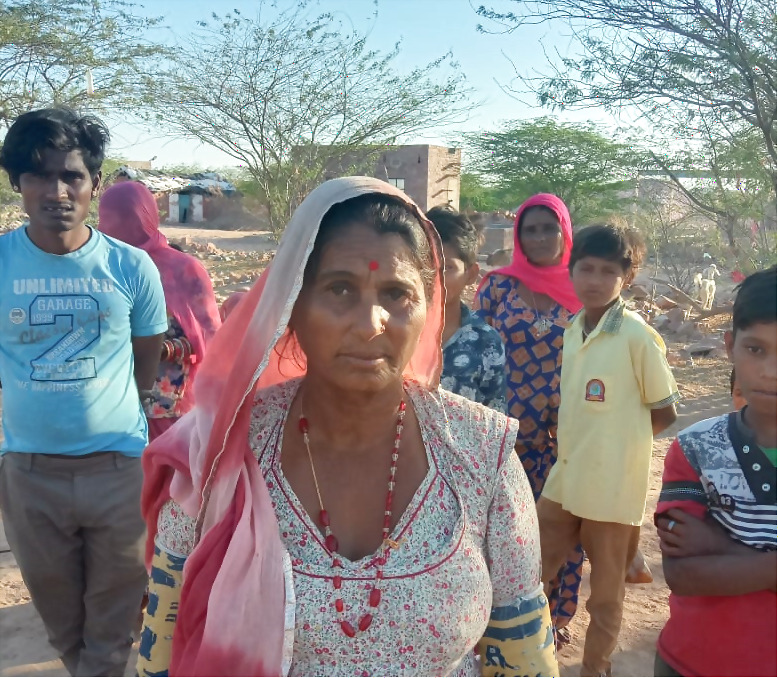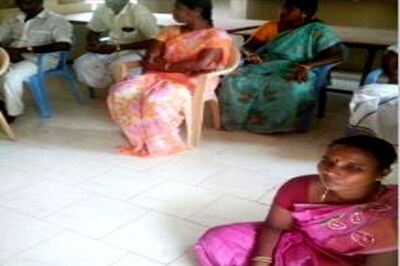
views
New Delhi: Finance Minister Nirmala Sitharaman's Rs 1.7 lakh crore economic relief package meant to ensure food security for the poor may end up not reaching those who need it the most.
Earlier this week, the Finance Ministry rolled out the Pradhan Mantri Garib Kalyan Yojana that included distribution of extra foodgrains and direct cash benefits transfer to women, farmers and construction workers among others.
However, all of these will only include beneficiaries already registered under central schemes — there will be no centrally sponsored help for those outside its purview.
News18 spoke to rehabilitated bonded labourers, unregistered construction workers, migrant labourers, women from marginalised sections of society and others across Rajasthan, Madhya Pradesh, Telangana, Andhra Pradesh and Tamil Nadu to conclude that tens of thousands will be left out of the economic relief package.
Unregistered workers
Sitharaman on Thursday said the Centre will direct state governments to utilise the construction workers' welfare fund to support them against the economic disruption. She said the fund created by a central government Act currently has about Rs 31,000 crore in it. A total of around 3.5 crore workers are registered under it.
The total number of construction workers in India stands at 5.1 crore, according to government figures. So this economic package may leave out 1.6 crore construction workers not registered with any welfare board.
The Building and Other Construction Workers (Regulation of Employment and Conditions of Service) Act, 1996, (BOCW Act) and the Building and Other Construction Workers' Welfare Cess Act, 1996, (Cess Act) mandates 1% cent cess on cost of construction. This money is supposed to be used for the welfare of workers employed in the informal construction sector.
Close to Rs 52,000 crore has been collected as BOCW Welfare Cess, of which Rs 31,000 crore remains unutilised, which raises a separate set of questions on the government's intent after being reprimanded by the Supreme Court to come up with a welfare scheme to use the funds stacked over years.
A bench, comprising Justices Madan B Lokur and Deepak Gupta, had made it clear that "no further time" would be granted to the government to finalise the welfare scheme.
"I have been a construction worker for the last 20 years. I had earlier registered, but that has lapsed. There are no benefits you get after registering. Now the government will provide money to only registered workers, what will I do? I have no work due to the lockdown and I may not get central help as well," said Raju Kamal, 39, currently in Madhya Pradesh's Shivpuri.
Kamal travels to Delhi after October where he gets more work and makes Rs 8,000 a month. In the current circumstances, he says his savings and ration will last a couple of more days. He is the sole breadwinner in a family of six.
Meanwhile, a survey conducted by NGO Jan Sahas in MP on 66,000 construction workers found that merely 5.96% -- 3970 individuals -- were registered to any of the welfare boards.
About 97.2% belonged to Scheduled Castes, Schedule Tribes and other backward castes. Almost 16,000 did not have Aadhaar cards and close to 7,000 did not have bank accounts.
No Bank Accounts
As part of the relief package, Sitharaman said direct benefit cash transfers will benefit farmers, MGNREGA workers, poor widows and pensioners, among others.
However, a large section of the poor do not have bank accounts. In fact, the number may be as high as 19.1 crore, according to a report by the World Bank. The report also says India has the world’s highest share of inactive accounts, about twice the average of 25% for developing economies.
The BJP-led National Democratic Alliance's (NDA) flagship scheme, Jan Dhan Yojana, did garner global appreciation for going a long way in formalising the flow of funds by getting 82% Indians to open up bank accounts, up from a meager 53% in 2014. However, the remaining 18% may still be a gap too important to ignore at times of such a crisis.
"It has been three days since I ate anything. I am not registered under any scheme. I have no bank account and no Aadhaar card," said Venkat who was recently rescued from a brick kiln in Telangana where he was kept as a bonded labour. Since the lockdown, he has been staying at a temporary settlement where there is no provision of food.
On the third day of the lockdown, NGO Foundation for Sustainable Development (FSD) brought him food.
FSD Executive Director K Krishnan said the group had received 1,700 phone calls in the past few days from across Telangana, Andhra Pradesh, Kerala and Tamil Nadu from families with no food and money.
Almost all of these calls are from households belonging to tribal communities not covered under any government-sponsored benefits due to non-availability of basic documents like Aadhar cards and bank accounts.

Sau Devi, a member of the Kalbelia community has had nothing to eat ever since the lockdown. She has no bank account and no national identity card. (News18.com)
Sau Devi, 35, did not even know there would be a national lockdown. When asked about it, she called it a "curse".
Along with 45 others, Devi belongs to the Kalbelia community and works in the mines, roughly 20km from Rajasthan's Jodhpur. No member of the community has a bank account or any kind of national identity card.
"We have found no work for the last 15 days. Suddenly everything closed down. There are very young children in this group who have been starving," she said.
An NGO called Jai Bhim, based in Rajasthan, has been providing food and arranging shelter for people.
"Let alone bank accounts, there are people who have no money even for the next day. How do you expect them to be registered under central schemes? We welcome the government's move to help the poor, but every panchayat in each village needs to ensure door-step delivery of essentials. Only then can we ensure that nobody dies hungry," said Tulsidas, district head at the NGO.
Inaccessibility to Fair Price Shops
Sitharaman had also announced that 1kg dal will be given free to beneficiaries. The Prime Minister Garib Ann Yojna will ensure that each one will get an additional 5kg rice or wheat per month in addition to the existing scheme. However, the problem lies in ration cards and accessibility to fair price shops.
The food distribution through fair price or public distribution shops may do little in benefitting the migrant population since we do not have a nationwide portability of ration cards yet.
The Centre has rolled out the ‘one nation, one ration card’ initiative in 12 states, but crores of migrant labourers finding it difficult to return home, mostly from different states, will get no benefit.
Khemchandra Banjara, a migrant worker, has been trying to get to MP's Bina from Jaipur on foot. Police have stopped him several times, but he has found no other means to return home.
"I have no food at all. I had to literally beg in front of police officers to give me something to eat. I will be able to access ration shops only once I get home, which for now seems really difficult," he said.
Bhagwan Das, 44, is also a migrant labourer and is currently stuck in Haryana's Rohtak at a temporary shelter with 200 others. He needs to reach Mahau in Uttar Pradesh.
"All of us have been starving. Whenever somebody comes, we ask them for food. Some give us, some don't. This is by far the toughest time I have ever seen," he said.
Das has a bank account and a ration card. But his card is registered to a fair price shop in his village, hundreds of kilometres away. He also has no debit card to withdraw money.
It is a similar case with close to 200 families who called FSD for help.
"Most of these families live in the foothills or away from normal settlements. That is because they belong to trbal communities and upper caste villagers do not allow them to live near them. So they either do not have ration cards or if they do, the nearest public distribution shop (PDS) is 30-35km away," said a member of the NGO.
Not just economic difference, India's caste fault-lines are also starting to embolden themselves at the time of a pandemic-level crisis.




















Comments
0 comment